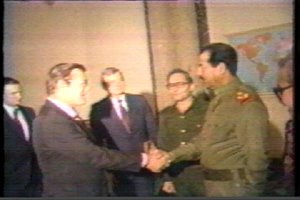Maha@Mahablog posts this excellent piece on Reagan and Bush I buddying up to Saddam back in the day, and I learn something new:
Senators Claiborne Pell, Al Gore, and Jesse Helms introduced legislation to impose sanctions on Iraq, and the Senate passed a Prevention of Genocide Act, unanimously, just one day after it was introduced.
My jaw drops, and I make my way to Google Gov to see if any traces of such a bill remain.
I find just a tad bit more than I’m looking for.
The bill summary comes up, all right, in the Library of Congress legislative database (even though it’s 100th Congress, and I can’t find a way to search Congresses prior to the 101st on the LoC legislation search page). Introduced on September 8, 1988, passed by voice vote the next day, sponsored by notables such as Dick Lugar, Jesse Helms, Carl Levin and one Albert Gore, Jr. . . .
But what are these other two results? Hrm, they seem to be HTML and PDF versions of some article, hosted on .mil sites. That’s interesting . . .
Inverse Engagement: Lessons from US-Iraq Relations, 1982-1990
Les . . . sons?
What a concept.
In any event, first I seek out what brought me here in the first place:
- An embargo on all dual-use technology exports
- The elimination of all CCC and Export-Import Bank credits
- An embargo on all US imports of Iraqi oil
- A requirement that all loans to Iraq under consideration in international financial institutions (the International Monetary Fund, the World Bank, etc.) be opposed by the United States
Liberal and conservative senators alike lent their outspoken support to this assertive legislation. Liberal Democrat Claiborne Pell declared, “Iraq’s conduct is a crime against humanity. . . . It must be met with the strongest possible response.” His conservative Republican counterpart, Senator Jesse Helms, concurred in stating that the Senate legislation “will help demonstrate to the Iraqi regime just how serious our country views its campaign against the Kurds. In addition, it will help assure that United States tax dollars do not subsidize the Iraqis.” As members of the Senate saw it, the time had come for exercising whatever leverage the United States held in its relationship with Iraq. However, despite the unanimous support of the Senate, over the course of the next few months, the sanctions bill was systematically watered down, and it eventually died under the heavy influence of both the Administration and opponents within the House of Representatives.

Wow. First I rub my eyes and read that over again, then I check to make sure I am indeed reading a page on army.mil and haven’t accidentally clicked away.
And then I read on, and it gets . . .
Um . . .
Better?
Not quite.
At this point I go and check to make sure the article isn’t dated April 1.
What in the blue bloody Hell am I reading?
By this point I actually feel nauseous.
I’ve asked variations on the same question over and over again of Bush supporters: “You can rationalize the Reagan administration’s support for Saddam however you want, but the real problem is: Since the people making policy today are the same ones who refuse to even acknowledge their history of supporting this monster, what reason do we have to think they’re not making the same mistakes over again, and creating a whole new monster in the process?“
It’s a question they don’t seem to take very seriously.
Too certain of the integrity and wisdom of their fearless leader, I suppose.

Anyone?
Please?


